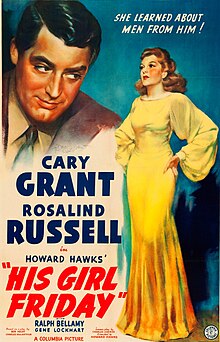| His Girl Friday | |
|---|---|
 Theatrical release poster | |
| Directed by | Howard Hawks |
| Screenplay by |
|
| Based on | The Front Page 1928 play by Ben Hecht Charles MacArthur |
| Produced by | Howard Hawks |
| Starring | |
| Cinematography | Joseph Walker |
| Edited by | Gene Havlick |
Production company | |
| Distributed by | Columbia Pictures |
Release date |
|
Running time | 92 minutes |
| Country | United States |
| Language | English |
His Girl Friday is a 1940 American screwball comedy film directed by Howard Hawks, starring Cary Grant and Rosalind Russell and featuring Ralph Bellamy and Gene Lockhart. It was released by Columbia Pictures. The plot centers on a newspaper editor named Walter Burns who is about to lose his ace reporter and ex-wife, Hildy Johnson, newly engaged to another man. Burns suggests they cover one more story together, getting themselves entangled in the case of murderer Earl Williams as Burns desperately tries to win back his wife. The screenplay was adapted from the 1928 play The Front Page by Ben Hecht and Charles MacArthur. This was the second time the play had been adapted for the screen, the first occasion being the 1931 film which kept the original title The Front Page.
The script for His Girl Friday was written by Charles Lederer and Ben Hecht, the latter of whom is not credited for his contributions. The major change in this version, introduced by Hawks, is that the role of Hildy Johnson is a woman. Filming began in September 1939 and finished in November, seven days behind schedule. Production was delayed because the frequent improvisation and numerous ensemble scenes required many retakes. Hawks encouraged his actors to be aggressive and spontaneous. His Girl Friday has been noted for its surprises, comedy, and rapid, overlapping dialogue. Hawks was determined to break the record for the fastest film dialogue, at the time held by The Front Page. He used a sound mixer on the set to increase the speed of dialogue and held a showing of the two films next to each other to prove how fast his film was.
His Girl Friday was #19 on American Film Institute's 100 Years ... 100 Laughs and was selected in 1993 for preservation in the United States National Film Registry of the Library of Congress as "culturally, historically, or aesthetically significant".[2][3] The film is in the public domain because the copyright was not renewed; the play it was based on remained under copyright for several decades until it expired in 2024, fully releasing the film from remaining copyright.[4]
- ^ Mankiewicz, Ben and Muller, Eddie (July 23, 2020) Intro to the Turner Classic Movies presentation of the film
- ^ "Librarian Announces National Film Registry Selections (March 7, 1994) - Library of Congress Information Bulletin". www.loc.gov. Retrieved October 30, 2020.
- ^ "Complete National Film Registry Listing". Library of Congress. Retrieved October 30, 2020.
- ^ Jackson, Matthew (March 6, 2017). "11 Classic Films in the Public Domain". mentalfloss.com. Retrieved January 4, 2019.